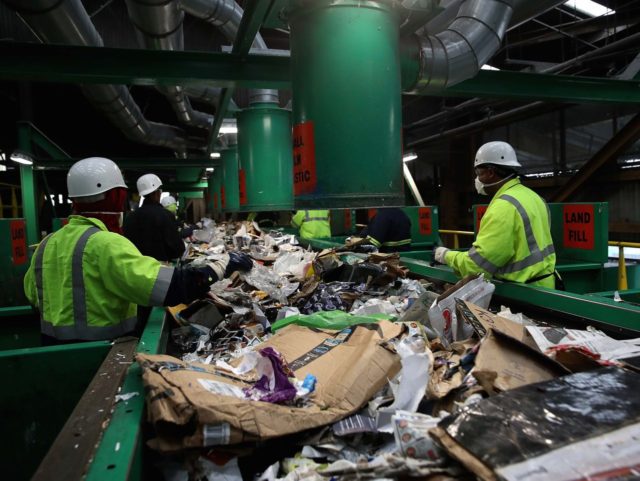California trash separated for recycling is increasingly being sent to landfills after China slashed its demand for importing American waste, according to the Los Angeles Times.
Gov. Jerry Brown and the California legislature passed AB 341 in 2011 and set a policy goal to reduce, recycle, or compost 75 percent of what would have been trash by 2020. By August 2015, California had achieved a 50 percent statewide recycling rate, and a beverage container recycling rate of 80 percent.
But the Los Angeles Times has reported that despite distributing blue recycling bins to almost all California communities, California has failed to improve on the 50 percent recycling rate, because residents are mixing non-compliant materials into the blue bins such as batteries, broken glass, used food wrappers, soiled diapers, and unrinsed bottles.
Contracts to purchase supposedly recyclable trash require separation, cleaning, and processing of materials before they are shipped to industrial users. Introduction of incompatible materials is usually deemed a failure of the purchasers’ commodity specifications and leads to yield loss, which means “recyclable” material will be dumped in landfills.
The largest buyer of California’s recyclable material has been China. The business was so big that container loads of scrap and waste amounted to the sixth-largest U.S. export to China and had a positive impact on the U.S. trade deficit with China, according to CNN.
The California Department of Resources Recycling and Recovery (CalRecycle) reported in 2015 that recyclables accounted for one-fourth of all California seaborne exports by weight. But in July 2017, China announced a policy to reduce its own pollution, called National Sword, which limited the import of recyclable materials if one-half of one percent were contaminated by not meeting the commodity specification.
California residents are still being required to comply with state and local laws to separate trash, but an official with Bay Area trash hauler Recology told the Times that there now is almost no market for separated trash.
In mid-March, China announced Blue Sky 2018, an enforcement campaign to prevent the import of banned recycling materials by the end of the year. The expanded materials ban includes a wide variety of plastics; smelted steel and iron residue; electrical appliance scrap; wire and cable; and compressed cars. California, with $5.2 billion of scrap and trash exports to China in 2017, expects to be seriously impacted by an expanded materials ban.
CalRecyle is asking local government agencies and the refuse industry to respond by improving post-collection processing of trash and scrap, including hiring more workers and slowing down sorting lines to eliminate contamination before export.
But the Times reports that about 1,000, or 40 percent of California recycling centers have closed over the past two years. Several state lawmakers are talking about raising the recyclable content percentage for beverage containers, and paying higher subsidies for recycling.

COMMENTS
Please let us know if you're having issues with commenting.